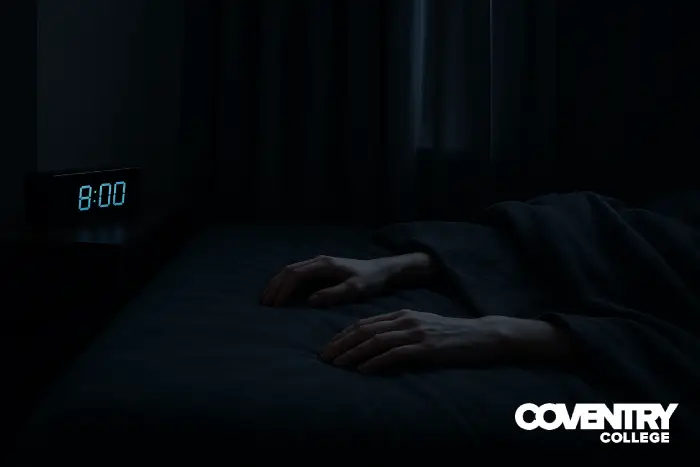Good sleep isn’t just beneficial; it’s essential, particularly during exam periods when your brain needs optimal functioning. Improving your sleep quality directly impacts memory, problem-solving abilities, concentration and emotional resilience. Here’s a detailed breakdown of practical and science-backed strategies to help you get restorative sleep during this critical period.
Understanding Your Sleep Cycle
Sleep occurs in several stages: light sleep, deep sleep, and REM (Rapid Eye Movement) sleep. Each phase serves a specific purpose:
- Light Sleep: Prepares your body for deep sleep, transitioning you gradually.
- Deep Sleep: Crucial for physical recovery, strengthening the immune system, and consolidating memories.
- REM Sleep: Essential for emotional processing, learning and memory retention.
Practical Steps for Better Sleep Hygiene
1. Consistent Sleep Schedule
Regular sleep-wake patterns reinforce your body’s internal clock (circadian rhythm). Aim for consistency, even on weekends, to help regulate hormones such as melatonin and cortisol that influence sleep quality (Walker, 2017).
2. Optimise Your Sleep Environment
A comfortable sleep space enhances sleep efficiency. Recommendations include:
- Temperature between 16°C – 18°C for optimal sleep quality (Sleep Foundation, 2023).
- Darkness, as light exposure, can interfere with melatonin production (Blume et al., 2019).
- Minimal noise or white noise to mask disruptive sounds.
3. Limit Blue Light Exposure
Exposure to blue light from screens inhibits melatonin production, disrupting sleep cycles. Limiting screen use at least an hour before bed significantly improves sleep latency and quality (Chang et al., 2015).
4. Mindfulness and Relaxation Techniques
Practicing mindfulness meditation or deep-breathing exercises can significantly decrease anxiety and stress, enhancing overall sleep quality. Guided meditation apps such as Headspace or Calm can be useful resources.
5. Dietary Considerations
Diet has a notable impact on sleep:
- Caffeine: Avoid caffeinated beverages at least 6 hours before bedtime, as caffeine’s half-life can extend several hours (Drake et al., 2013).
- Alcohol: Although it may initially induce sleepiness, alcohol significantly disrupts sleep quality, particularly REM sleep (Ebrahim et al., 2013).
- Heavy meals: Avoid eating large meals within two hours of bedtime to reduce the risk of acid reflux and discomfort.
6. Exercise Timing
Regular physical activity enhances sleep quality, reducing insomnia symptoms. However, vigorous exercise should be completed at least three hours before bed due to its stimulating effects. Gentle activities like yoga and stretching are beneficial closer to bedtime (Buman & King, 2010).
7. Separate Study and Sleep Spaces
Maintaining distinct environments for studying and sleeping reinforces psychological cues that associate your bed exclusively with sleep, enhancing sleep efficiency (Irish et al., 2015).
8. Manage Pre-exam Anxiety
Cognitive strategies to manage anxiety include:
- Journaling: Writing down worries or tasks before bed reduces anxiety-induced sleep disruption.
- Visualisation: Imagining yourself handling exam situations calmly and successfully can reduce anticipatory anxiety.
Recognising When to Seek Help
Occasional sleeplessness around exams is common; however, consistent difficulty sleeping may indicate a sleep disorder or underlying stress. Seek support from:
References
- Blume, C., Garbazza, C., & Spitschan, M. (2019). Effects of light on human circadian rhythms, sleep and mood. Somnologie, 23(3), 147-156.
- Buman, M. P., & King, A. C. (2010). Exercise as a Treatment to Enhance Sleep. American Journal of Lifestyle Medicine, 4(6), 500–514.
- Chang, A.-M., Aeschbach, D., Duffy, J. F., & Czeisler, C. A. (2015). Evening use of light-emitting eReaders negatively affects sleep, circadian timing, and next-morning alertness. Proceedings of the National Academy of Sciences, 112(4), 1232-1237.
- Drake, C., Roehrs, T., Shambroom, J., & Roth, T. (2013). Caffeine effects on sleep taken 0, 3, or 6 hours before going to bed. Journal of Clinical Sleep Medicine, 9(11), 1195–1200.
- Ebrahim, I. O., Shapiro, C. M., Williams, A. J., & Fenwick, P. B. (2013). Alcohol and Sleep I: Effects on Normal Sleep. Alcoholism: Clinical and Experimental Research, 37(4), 539–549.
- Irish, L. A., Kline, C. E., Gunn, H. E., Buysse, D. J., & Hall, M. H. (2015). The role of sleep hygiene in promoting public health: A review of empirical evidence. Sleep Medicine Reviews, 22, 23-36.
- Sleep Foundation. (2023). Best Bedroom Temperature for Sleep. Retrieved from https://www.sleepfoundation.org/bedroom-environment/best-bedroom-temperature-for-sleep
- Walker, M. (2017). Why We Sleep: Unlocking the Power of Sleep and Dreams. Simon & Schuster.



